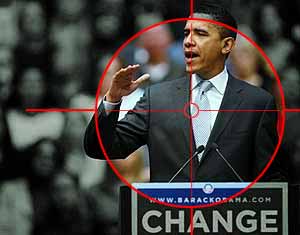March 02, 2008 (the date of publication in Russian)
Andrey Kobyakov, Alexander Rublev
THE IRON HEEL'S CANDIDATE
The US financial oligarchy still relies upon a war scenario of escape from economic crisis
 On February 28, Russian media highlighted the New York press conference of top US financiers dedicated to the election campaign. Alec Young, representative of Standard & Poor's, expressed the view that John McCain, the leading Republican candidate, is preferable for Wall Street, as he is going to continue George Bush's tax policy favoring the national financial sector.
On February 28, Russian media highlighted the New York press conference of top US financiers dedicated to the election campaign. Alec Young, representative of Standard & Poor's, expressed the view that John McCain, the leading Republican candidate, is preferable for Wall Street, as he is going to continue George Bush's tax policy favoring the national financial sector.
John McCain is committed to impede any increase of taxing, and to reduce the present 35% corporate tax to 25%.
David Reslerm managing director of Nomura Securities International, also approves McCain's strategy.
Wall Street's bosses believe that the success of leading Democratic candidate Barack Obama would result in capital flight from the United States.
"If you calculate at least half of Obama's promises to students, families, small businessmen, construction workers, unemployed etc., you'll realize that even your grandchildren won’t enjoy their implementation. Those promises require billions of dollars that are unavailable", the financiers said.
"Obama's team is a sort of Marxists. How are they going to build the promised roads, bridges and tunnels if the capitals feel insecure? Money will just escape".
The quoted comments are explicitly political. As a rating agency is not supposed to take the gauge of particular candidates, voters could be daunted only under a guise of financial expertise.
The elite of Wall Street traditionally prefer Democratic candidates. However, today, financiers are war-gaming various scenarios of the current economic crisis. Wall Street is troubled with the probability of an attempt of Democrats to return to a development strategy based on priorities of real economy, modernization of basic infrastructure and active social policy.
Both Hillary Clinton and Barack Obama intend a partial return to Roosevelt's principles of anti-crisis policy. This prospect does not appeal to the financial oligarchy.
On the contrary, Republican candidates – with the only exception for Ron Paul whose chance of success is nil – demonstratively neglect the economic crisis, and implicitly promise to maintain the status quo. This means continuation of a war scenario implemented since 2002-2003.
Under the circumstances of a crisis, the financial oligarchy traditionally prefers a war scenario. This happened in Germany in 1930s when fat purses chose the Nazi party. Similarly, top financiers favored Mussolini in Italy and Petain in France.
Relevant tendencies are visible in today's United States – as all the Republican candidates except Ron Paul have expressed commitment for authoritarian policy, unrestricted with fundamental principles of American democracy, with the spirit and letter of the US Constitution.
Contrary to the Constitutional provisions excepting involvement of the United States in undeclared wars, in unjustified aggressive military campaigns in regions that are too remote to endanger US national security, all of these candidates pursue continuation of the current expansionist policy line, maintaining the US status of a "global policeman". John McCain was most persistent in promoting this approach during the campaign.
During the TV debates in North Carolina, McCain claimed that the US military presence in Iraq and Afghanistan might last one hundred years if necessary.
Thus, no Republican candidate, except Ron Paul, could propose any alternative to the incumbent hawks from the Bush-Cheney administration. That is why Alec Young was dispatched to the press conference to express the general sympathy of Wall Street to Mr. McCain. The financial oligarchy sees the escape from the crisis exceptionally in a war scenario; it is explicitly uninterested in reorganization of the US economy.
In fact, Wall Street’s experts denounce any initiative of realistic readjustment of US economy, viewing it as infringement on oligarchic interests. In their short-term
Strategy, they target Barack Obama as the obvious frontrunner of the Democratic contest and of the Presidential race generally.
Meanwhile, McCain's chances of defeating Obama are miserable. McCain performs as a cartoon super-hawk, a political dinosaur, a fossil of the Cold War era. The broad audience, grown up in a different atmosphere, is unsympathetic with his rhetoric. Is there any other serious and powerful bidder acceptable for relevant political circles?
The only plausible alternative to McCain was represented by New York City Mayor, billionaire Michael Bloomberg who could turn the tide by means of huge investments in his campaign.
Relatively young and ambitious, this dignified representative of the US financial oligarchy had proven his political skills during the Mayor campaign where he managed to overcome the "unsinkable" Rudi Giuliani, already then being regarded as a promising candidate for Presidency.
Though Michael Bloomberg recently quit the Republican race, his independent bid is still in force. He still has a possibility to resume his campaign – which, in case of success, is likely to result in a harsh and even ruthless liberal dictatorship.
Number of shows: 1170
 ENG
ENG 

 ENG
ENG 
